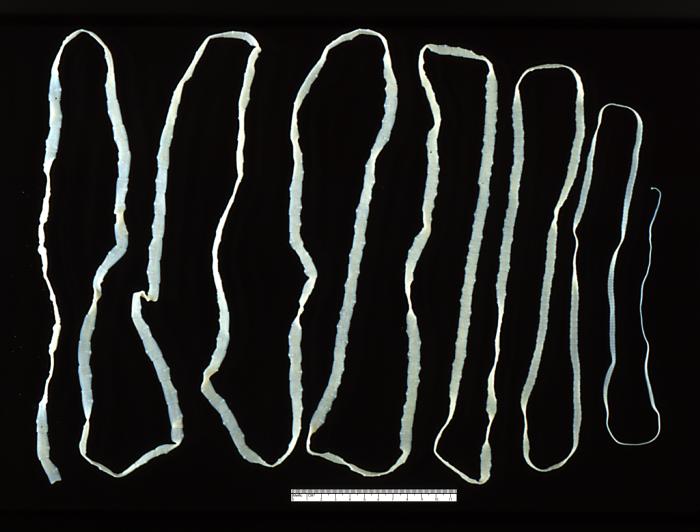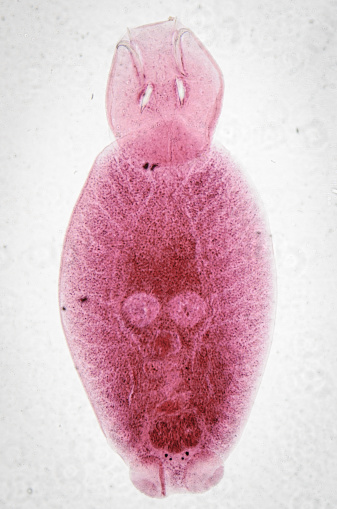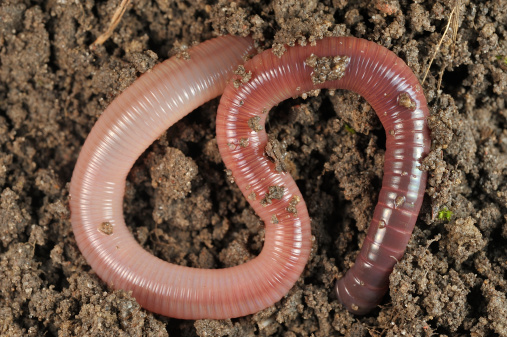


There are three main kinds of worms, divided into three different phyla--Platyhelminthes, Nematoda, and Annelida.
Platyhelminthes includes all the flatworms, which are mostly parasites and ribbon-like in structure, pictured to the left. Nematoda includes all the roundworms, which are mostly parasites and have rounded bodies, as pictured in the center. Annelida includes the most complex worms--segmented worms--which are the most complex animal presented up to this point and includes worms such as the earthworm pictured on the right.
Watch this video to learn about the significance that worms in these phyla have to humans.
![]() Worms play a significant role in our world. When humans interact with them, it can be good and sometimes and it can be bad, but without them, the ecosystem with fail to thrive. For example, the beef tapeworm Taenia saginata, are of the phylum Platyhelminthes. It starts off as larvae in cow muscles, but then lives out its adulthood in the intestines of humans. They can grow to over 10 meters long. They are transferred to the human through consumption of beef. Cooking your meat thoroughly is extremely important. In the roundworm phylum--Nematoda—Trichenella is commonly found in humans. The females lay their eggs inside the small intestines of pigs, then the larvae grow into very resistant and resilient cysts in the muscles. Humans can be infected with the parasite if they eat undercooked pork containing these cysts. It's preventable though, just cook your pork thoroughly before eating it. The most common worm from the phylum Annelida is the earthworm Lumbricus terrestrisand. It plays an important role in human ecosystems. They eat their weight in soil every day, creating tunnels that aerate the soil. They leave behind their feces which is a nutritious, rich fertilizer for the soil. This makes for very healthy gardens. While you don't want to encounter the parasitic worms, like flatworms and roundworms, in your digestive system, earthworms actually provide healthy soil so that you can have wonderful produce to fill your stomach.
Worms play a significant role in our world. When humans interact with them, it can be good and sometimes and it can be bad, but without them, the ecosystem with fail to thrive. For example, the beef tapeworm Taenia saginata, are of the phylum Platyhelminthes. It starts off as larvae in cow muscles, but then lives out its adulthood in the intestines of humans. They can grow to over 10 meters long. They are transferred to the human through consumption of beef. Cooking your meat thoroughly is extremely important. In the roundworm phylum--Nematoda—Trichenella is commonly found in humans. The females lay their eggs inside the small intestines of pigs, then the larvae grow into very resistant and resilient cysts in the muscles. Humans can be infected with the parasite if they eat undercooked pork containing these cysts. It's preventable though, just cook your pork thoroughly before eating it. The most common worm from the phylum Annelida is the earthworm Lumbricus terrestrisand. It plays an important role in human ecosystems. They eat their weight in soil every day, creating tunnels that aerate the soil. They leave behind their feces which is a nutritious, rich fertilizer for the soil. This makes for very healthy gardens. While you don't want to encounter the parasitic worms, like flatworms and roundworms, in your digestive system, earthworms actually provide healthy soil so that you can have wonderful produce to fill your stomach.
Question
Why do you think it is important to learn about worms?
